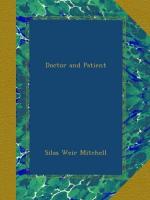The cases of Lord Byron and Walter Scott are to the point. The former was sensitive and morbid about his deformity. I cannot help thinking that had his mother been other than she was, he would have been brought up to more wholesome views as to what was after all no very great calamity. Walter Scott suffered from a like trouble, but healthy moral surroundings and a cheerful nature saved him from the consequences which fell so heavily upon his brother poet.
Epilepsy is a malady but too common in childhood, and as to which a few words apart are needed. Usually a child epileptic for some years will carry the disease with it for a time, the length of which no man can set. The disease may be such as to ruin mind and body, or the attacks may be rare, and not prevent courageous and resolute natures from leading useful lives. All intermediate degrees are possible. As a rule, no children need so inflexible a discipline as epileptics. Indulgence as regards them is only another name for ruin. Do as we may, they are apt to become morally perverted, and require the utmost firmness, and the most matured and educated intelligence, to train them wisely. Difficult epileptics and most idiots are best looked after, and certainly happiest, in some one of the competent training-schools for feeble-minded children.
Even the milder epileptic cases are hard to manage. I rarely see one which has been intelligently dealt with. Few mothers are able or willing to use a rule as stern, as enduring, as unyielding as they require.
As to education, I am satisfied that these children are the better for it, and yet almost invariably I find that in the cases referred to me some physician has, with too little thought, recommended entire abandonment or avoidance of mental training. I have neither space nor desire to go into my reasons for a different belief. I am, however, sure that education limited as to time, education of mind, and especially of the hands, has for these cases distinct utility, while to them also, as to the other children crippled in mind or body, all that I have already urged applies with equal force.
As to the management of sick or crippled childhood, I have said far more than I had at first meant to say, and chiefly because I have been made to feel, as I thought the matter over, how far more difficult it is in practice than in theory. But this applies to all moral lessons, and the moralist must be credited by the thoughtful mother with a full perception of the embarrassments which lie in her path.
NERVOUSNESS AND ITS INFLUENCE ON CHARACTER.
There are two questions often put to me which I desire to use as texts for the brief essay or advice of which nervousness[4] is the heading. As concerns this matter, I shall here deal with women alone, and with women as I see and know them. I have elsewhere written at some length as to nervousness in the male, for he, too, in a minor degree, and less frequently, may become the victim of this form of disability.




